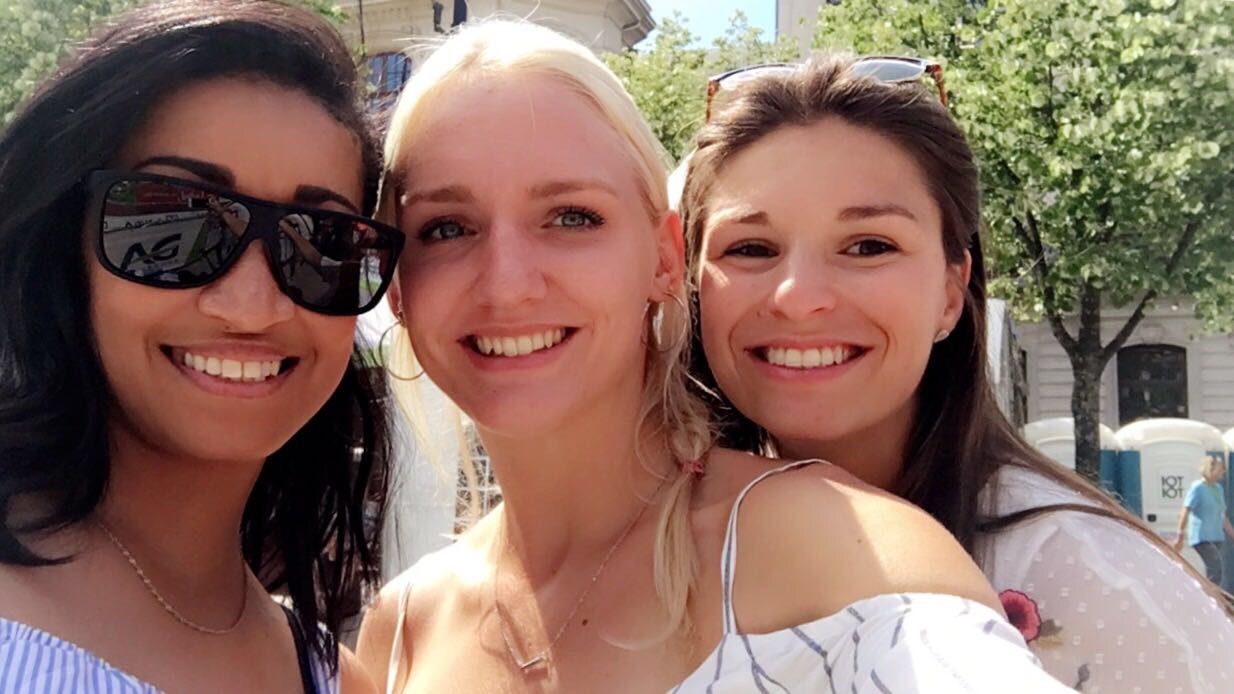Pre-departure:
When getting ready to leave to go overseas, always see that your visa application is done way before you leave. I had to apply to the Belgian embassy and prior years I needed to compile all that is required and then take it myself to the embassy for processing. Now they work differently, whereby you still compile all the requirements, but you need to take it to an external company namely TLS in Cape Town and they check and send all your documents to the embassy. The only thing is you need to pay them R450 for doing this and then still pay the Schengen visa costs. It was compulsory however, only if it’s an emergency may you go to the embassy yourself. On a positive note, I received my visa within one week, so that is good.
Experience at host institution:
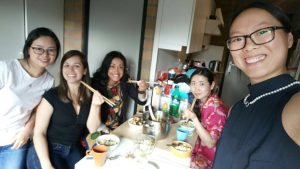
The experience of studying at Vrije University Brussels (VUB) in Belgium was an experience I will never forget. All staff and PhD students at the department of sport and movement science welcomed me warmly upon arrival. The most striking aspect was the PhD culture I witnessed at the institution. The working space was big and a great environment to work on your project. No one would have a fixed desk, in the afternoon you would pack up all your things, and the next day it will be first come first serve. The students were quite friendly and approachable. The PhD students who were present were a universal group ranging from China, Brazil and Belgium. The professors and the PhD Students share a really good relationship and sit with each other during lunch time. When I asked a Professor about this, she looked at me and simply stated , “over here we see our PhD students as our colleagues because we all work collectively on publishing articles”. Quite observant for me as well was the warm lunch served at the eating hall every day, which ranged from meatballs, to fish and pasta.
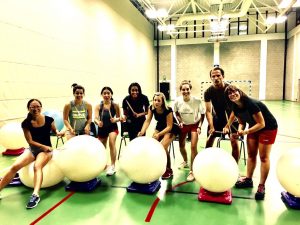
The professor at VUB was very friendly and very knowledgeable when it comes to her work. She provided excellent guidance and support during my stay. I had lots of work and reading to do but we would always unpack my findings in our weekly 1 to 2.5 hour meetings we had. At VUB what I really liked was the presentations that the students had to give to their peers and their professors, termed PhD day. In these meetings, you would present as if at a conference and you would receive feedback on the content and your presentation skills. You could identify problems you need help with and together you will share knowledge and information, trying to solve the dilemmas. The professor would critique the entire presentation from a positive and negative perspective. I see this as a good learning opportunity and a sharing platform, which facilitates the idea that a PhD is not working towards a product but a journey of learning.
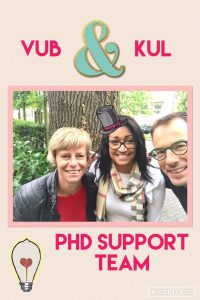
Concerning my study, I am working alongside two professors in Europe. One from KU Leuven (KUL) and the other from VUB who is the partner institution to my joint PhD with SU. I completed my MSc at KUL, so going back to my old campus was a great experience and visiting all the lecturers and old friends was great. Both universities are excellent and pride themselves on quality work production and ethic. I only knew KUL, so now to be able to experience life at VUB was such an honour and awesome learning experience, which will only add to my academic growth.
Return to Stellenbosch:
After all the hard work: Reading scientific articles and books, applying it to my work, analysing concepts etc., I came home mentally tired, but so enriched with knowledge and a new perspective not only on my research but academics as a whole. I seek to implement many of the new concepts and things I was taught in my own classes, which I lecture. My aim going to Europe was to come home with structure to my PhD and clear aims and objectives. This was my goal, and in one month in being over there, I have achieved what I set out to do. I now have a clear vision of all my scientific articles and what needs to be done going forward. The professors at both universities really assisted me in formulating my objectives in order to take my PhD to the next level, thanks to their expertise in my field of interest. The academic experience has shaped my work but also given me confidence in my ability and capabilities to create structures to work from and then produce quality work. My intricate organisational skills has shown me that even when juggling two full time positions, one being a full time lecturer the other being a full time PhD student, that all things are possible if you set goals and ways to reach them in a strategic way with deadlines attached to it. I am grateful for the research experience and appreciative of the new perspective I have been given in this field of elite sport management. My mind has been opened to new possibilities and my theoretical framework for my study has been strengthened; which is what I set out to do.
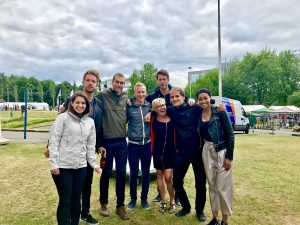
Tips for students or staff going to Belgium for an exchange:
- Public transport especially metros are very confusing to understand at first but thereafter once you actually sit down and map how it works, then it will become easy. You will get lost in the beginning but everything is so close by, you can always find your way back.
- I think the best tool would be to use your gps-tracking device on your phone and tap on public transport. You type in where you would like to depart from and where you would like to go and then tap public transport and then all forms will come up with the exact times and where to find it. I used this all the time. Sometimes you will have to take two modes of transport eg a train and then a metro. It is safe so do not worry. Even travelling at night was safe for me. It gets dark in summer at about 11pm, so I would try to get home before dark. Even in Brussels, it is safe.
- Public transport is very expensive but my suggestion would be instead of buying one ticket at a time, buy a ticket with many trips on it eg. Go pass, tien rit kaart, metro monthly card. You even get a card where you pay a certain amount per year or quarterly and that card would cover all modes of transport thus trains, busses, trams and metros. Just not aeroplanes sorry 😉
- I would suggest that even if you go for a month that you buy a Belgian sim card. It is much cheaper than roaming. There are also many places referred to as Wi-Fi zones so put your data off in those zones and put your Wi-Fi on, this will save you lots of euros. I used the base sim card, it has the cheapest charges.
- Cycling in Brussels city centre is not ideal. It is dangerous as there are busses, trams, cars and other bicycles on the street. Additionally, they drive on the right hand side as well; this whole experience was amazingly tough. I did it once from Uccle to VUB and then back and never again. Leuven is better for cycling, and much safer on the road.
- If you need to register for a PhD at KUL or VUB upon arrival, please take along your original Master’s degree diploma as they will not accept certified copies at all.
- If you are going to KUL, try to brush up on your Dutch language to be able to get by. If you are coming to Brussels you have to learn French, if at the VUB and you speak dutch or Afrikaans slowly then you will get by. Outside of the university in Brussels most people only speak French, no Dutch and no French. I really went unprepared as I felt I can speak fluent Dutch and English that I will be ok in Brussels which is the capital, but this was a huge fault on my side.
- On Sundays all stores are closed, everything. It becomes like a quiet town wherever you go in Belgium on a Sunday. If you want to shop for food or clothes, do it in the week before 18pm and on a Saturday, but not on a Sunday. In addition, check transports on Sundays as e.g. trains might only be available every hour to certain destinations.
- Bring warm clothing along even if you are coming in summer. We had one week of extremely warm weather ranging between 31-34 degrees everyday and then the other 3 weeks were partly cloudy and sometimes cold and rainy.
- With all the terrorist attacks happening you will see many soldiers with their fingers literally on the trigger around the university at VUB, Brussels airport, central station and all around Brussels city centre, especially around the touristic places. Do not be afraid. Just try to remain calm. For me I was shocked at first, as I did not know what to expect but thereafter I got use to their presence.
- Belgians are always on time; if you have arranged to meet someone at a certain time especially a professor, try your best to stick to it, as they are very punctual.
- A few friends, even Belgians themselves admit to this that at first Belgians might seem distant and maybe even a bit cold towards you, but once they get to know you and see your heart and that you are a good person, they will warm up to you and truly be friends with you for life. I experienced this years ago and to this day still keep in contact with most people I met there.

